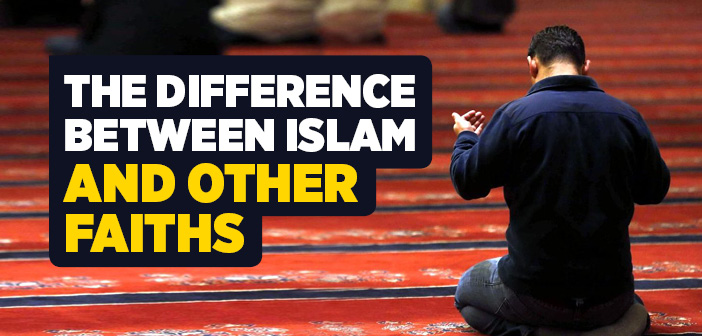What is the difference between islam and other faiths?
It is important to note that Islam is the only major religion that has been specifically named by a revealed scripture. Allah, may He be glorified and exalted, states in the Qur’an, “This day I have perfected for you your religion, and have bestowed upon you My bounty in full measure, and have been pleased to assign for you Islam as your religion.”[1] All the other well-known religions were named by the followers themselves, either after an individual figure due to a historical context, or due to a geographical setting. For instance, no term such as, ‘Judaism’ is found in the Hebrew Bible. In the Hebrew Bible Jewish people are sometimes called Hebrews and the Children of Israel/Israelites (b’nei yisrael). The Children of Israel began to be referred to as Judeans (Yehudim) based upon the name Judah (Yehuda), son of the Prophet Jacob (peace be upon him) and, subsequently, based upon the historical fact that since the sixth century before common era their nation was known as the kingdom of Judea (Yehuda). Much later these terms entered the English language as ‘Judaism’. The name of the religion of Christianity originated in the Greek language from the word ‘Christos’, the equivalent for the Hebrew term ‘Masiah’ (Messiah), the entitlement of the Prophet Jesus (peace be upon him). Earlier sources indicate that the early followers of the Prophet Jesus (peace be upon him) were known simply as members of the ‘Way’. Only when this religion was spread outside the Hebrew speaking community, amongst the Greek speaking communities, did the followers begin to use the term Christianity for their faith. Originally in the Indian subcontinent, ‘Hinduism’ was referred to by the adherents of this tradition as ‘vaidika dharma’, specifically named after their scriptures the ‘Vedas’. The term, ‘Hinduism’ is in fact a very recently coined umbrella term, invented by the British during the 19th century, after the Indus River in India, to refer to the religious traditions of the majority of the Indian people. Finally, Buddhism as a faith was specifically named as ‘Dharma of Buddha’ by Buddha Siddhartha Gautama’s followers after his death. All the above examples of the names of the different religions highlight that only Islam has a divine endorsement for being the religion specifically chosen by Allah, may He be glorified and exalted, for all of humankind. In fact, during the early 19th century it was common for missionaries and Orientalists to refer to Islam as Mohamedanism and to Muslims as Mohamedans. They tried to allocate a name to it in much the same manner as the other main world religions had received their names. However, this is very unacceptable to the divine faith of Islam named by God himself.[2]
The other main difference between Islam and other religions is that the Prophet Muhammad (peace and blessings be upon him) was sent by Allah for all of humankind. Whereas the Orthodox Jews consider themselves to be a chosen race and believe that their message is meant exclusively for themselves. Thus, many orthodox Jews do not believe in proselytizing their faith. The New Testament also makes it clear that Jesus’ mission was to the Tribes of Israel, however, it is evident that later Christians made it an obligation upon themselves to propagate their faith to all of humankind. The Hindus believe that all people should follow their dharma of their birth i.e. the religion you are born into; due to this belief they do not believe in any kind of proselytizing. Buddhism on the other hand, preaches a way of life where the existence of God is not important; instead, they focus only on the human being’s release from this world. In contrast to the above mentioned examples, Allah has decreed that Prophet Muhammad (peace and blessings be upon him) is His final messenger and has been sent to all humankind. Allah says, “Muhammad is not the father of any man among you, but he is the Messenger of Allah and the seal of the Prophets. And Allah is Ever All-Aware of everything”[3] Obviously, there are many other differences between Islam and the other world religions but at this point two main concepts need to be well-defined for the new Muslim.[4] Primarily, that Islam is the only sanctioned divine religion; secondly, that submission to Allah, may He be glorified and exalted, can only be achieved through the Prophet Muhammad (peace and blessings be upon him), who is the last Messenger of Allah. Let us now focus on the most common contemporary misconceptions regarding Islam.
[1]. Q. 5:6[2]. Amjad M. Hussain, The Study of Religions: An Introductions, Istanbul: IFAV, 2015.
[3]. Q. 33:40[4].For further reading on this subject please see Amjad M. Hussain, The Study of Religions: An Introductions, Istanbul: IFAV, 2015.
Source: Islam For New Muslims An Educational Guide,Assoc. Prof. Amjad M. Hussain, Erkam Publications





